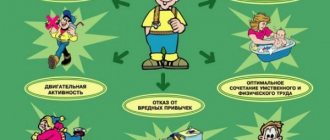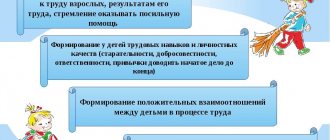Labor education of children in the family
Consultation for parents “Work education of children in the family”
“Education itself, if it wishes a person happiness, should educate him not for happiness, but prepare him for the work of life. Education should develop in a person the habit and love of work; it should give him the opportunity to find work for himself in life.” (K.D. Ushinsky).
Labor has always been the basis for human life and culture. Hard work and the ability to work are not given by nature, but are cultivated from early childhood. Work must be creative, because it is creative work that makes a person spiritually rich. In order for a child to receive a full-fledged education, not only joint activity with an adult, physical activity and the desire for knowledge are necessary, but work is also important.
Hard work is instilled from infancy. And here the contribution of not only educators, but also parents is needed. The desire to work is initially instilled by parents. And then it develops in kindergarten and school. If a child himself strives to work or carry out work assignments, then he develops a love of work and a sense of duty. His character is developed, skills and abilities in work develop quickly and, most importantly, with interest for the child himself.
The foundations of labor education are laid in the family.
The family is a friendly work team. The love of work must begin to be cultivated very early. Imitation, characteristic of a child, is one of the most important motives that encourage children to be active. Watching adults work gives rise to a desire to do the same. Not to extinguish this desire, but to develop and deepen it is the main task of parents if they want to raise a child to be a hard worker.
Success in instilling hard work can be called developing the habit in children of performing responsibilities independently. The child must be taught that he must do his work himself, then he will develop a sense of importance. And our responsibility – the responsibility of adults – is to develop independence, hard work and the desire for success.
Dear parents!
Allow me to provide you with a reminder on the topic
“Labor education of preschool children”
WHAT DOES IT MEAN to prepare a child for life? What is the main guarantee that this life, so dear to us, will be lived beautifully, brightly, and profitably? We will probably not be mistaken if we say: the main thing is to teach people to love work and find a source of joy in it. Without this there can be no success either in learning or in future activities; without this there is neither respect from others nor self-esteem. In other words, without this there is no happiness.
Only through systematic and persistent work is a personality formed and its best qualities forged.
Working together with other children, helping them and receiving their help, the child becomes more responsive and sensitive. Daily solution of one or another practical problem develops mental abilities, curiosity, and perseverance.
Love and the habit of work determine the future of a little person. When taking care of him, make sure he is hardworking!
Parents who think that the time for labor education comes when the child reaches school age or becomes even older are mistaken.
The desire for active practical action is characteristic of children, inherent in them by nature. This precious quality must be maintained, developed, and skillfully directed.
The earlier labor education begins, the better its results will be.
Tips for parents
- Involve the child in the work activities of the family as early as possible;
- Assign permanent responsibilities to the preschooler, for which he is responsible;
- Do not allow deviations from the requirements accepted by adults, otherwise the child will shirk fulfilling his responsibilities;
- Do not punish your child with work: work should please and bring satisfaction;
- Teach a child to work, instilling in him basic work culture skills: rational work methods, proper use of tools, planning the labor process, completing work;
- Do not give the child excessive tasks, but assign work with sufficient load;
- Do not rush, do not rush the child, be able to wait until he completes the work himself;
- Do not forget to thank the child for what required special efforts from him;
A child values and cherishes what he has made with his own hands, so it is necessary to involve him in socially useful work. This is where the education of respect for the public property begins.
Teachers: Bolotskikh N.V., Prokofieva E.B.
Methods of labor education for preschool children
In kindergarten, the initial foundation of hard work is formed. Educators teach children to engage in activities that are beneficial to society. Training must be carried out in a playful way, since this type of activity is the leading one for preschoolers.
Children need to be taught from an early age the need to help their parents
You need to raise a child gradually, as he will have to master several stages. He will have to develop skills, be able to set goals, plan his work and achieve results.
Important! At preschool age, children have only external motivation, i.e. they need financial incentives.
At preschool educational institutions, teachers help children master the first tools of labor. The teacher also sets goals and monitors their achievement - this is good to develop through self-service skills.
The role of family traditions
The position of an adult when teaching a child work activities is helping. For example, if a baby asks to lace his shoes, then the parent does not need to sit him on a chair and do it for him. The right thing to do would be to show him how it’s done and help him cope with it himself.
It is necessary to develop social and everyday skills in the child
Nurturing hard work in preschoolers depends on various factors. Mastering simple skills begins with observing an adult. If parents often clean, wash dishes, etc., then the baby will begin to try to repeat after them.
At the age of 3, the child develops the need “I myself.” It is from this moment that you can begin training.
The relevance of the correct position of an adult
Educators can offer the brochure “Labor education in the family”; the consultation for parents contains practical advice and common mistakes. Moms and dads should systematically teach their children to do housework.
Some adults mistakenly ask a child to help only upon express request. This attitude interferes with proper teaching. Sometimes parents take an overprotective position. They do everything for the child, suppress his independence and initiative.
Close people should help the child cope with various tasks. For example, let him dress on his own and get ready for a walk.
Important! Don't expect your child to do it perfectly the first time.
Teaching children work skills begins with demonstrations of action. The parent should provide support for the slightest attempts to do something independently. For example, wipe the floor. Even if a child just rubs the dirt, initiative should be encouraged.
If an adult begins to overprotect the child, he will quickly get used to being lazy and will have no desire for personal activities.
Goals and objectives of labor education of preschool children
Basic information
Municipal budgetary preschool educational institution “Kindergarten No. 221” of a combined type (MBDOU “Kindergarten No. 221”)
photo
Establishment date of the educational organization: 1985
Let's decide together
Can't enroll your child in kindergarten? Would you like to tell us about the teachers? Do you know how to improve your diet and exercise?
About the founder(s) of the educational organization
The founder of the Institution and the owner of its property is the urban district - the city of Barnaul, Altai Territory. Address: Barnaul, st. Union of Republics, 36-a., tel. (8-3852) 66-75-53 Email address: Chairman of the Committee Mul Andrey Genrikhovich tel. (8-3852) 56-90-45 Reception: Email address The functions and powers of the founder of the Institution on behalf of the urban district - the city of Barnaul of the Altai Territory are performed by the Education Committee of the city of Barnaul. The functions and powers of the owner of the property of the Institution on behalf of the urban district - the city of Barnaul of the Altai Territory are performed by the committee for the management of municipal property of the city of Barnaul.
On the names of representative offices and branches of the educational organization (if any) (including those located outside the Russian Federation)
There are no representative offices or branches of the educational organization. There are no representative offices or branches of the educational organization located outside the Russian Federation.
About the location of the educational organization
Legal address : 656057, Altai Territory, Barnaul, st. Panfilovtsev, 12
Actual address: 656057, Altai Territory, Barnaul, st. Panfilovtsev, 12
View on the map of Barnaul
Find directions to Kindergarten No. 221 combined type
About the mode and work schedule of the educational organization
Working hours: five-day work week. The kindergarten is closed on Saturday, Sunday and holidays.
Working hours: Monday from 7.00 to 19.00 Tuesday from 7.00 to 19.00 Wednesday from 7.00 to 19.00 Thursday from 7.00 to 19.00 Friday from 7.00 to 19.00
About the contact numbers of the educational organization
tel/fax: 42-67-80; 42-43-24
About educational organization email addresses
e-mail:
About the addresses of official websites or pages on the Internet information and telecommunications network
Address of the official website of the educational organization 221dou.rf
The organization does not have official pages on the Internet information and telecommunications network.
On places of educational activities, including those not specified in the annex to the license (register of licenses) for educational activities
- places of educational activities for basic training programs: 656057, Altai Territory, Barnaul, st. Panfilovtsev, 12 ;
- places of implementation of educational activities for additional educational programs: 656057, Altai Territory, Barnaul, st. Panfilovtsev, 12 ;
- places of implementation of educational activities when using the network form of implementation of educational programs: no ;
- Places of practice: no ;
- Places for practical training of students: no ;
- Places for state final certification: no .
There are no places for carrying out educational activities not specified in the annex to the license (register of licenses) .
Practical advice
It’s not for nothing that teachers develop consultations for parents “Labor education for preschoolers.” It is this period that is very important for the formation of the first ideas about social and everyday skills.
When to start
Not only when being in a group, a child must follow the rules. At home he also runs errands and does various jobs. From an early age, he is taught to put toys in place, clean up after himself, and help his parents.
In kindergarten, teachers also develop independence, but this is not enough. Therefore, parents are also full participants in the process.
Education of hard work in preschool children takes place under the supervision of adults. They are the ones who help develop habits and skills. This process takes several years, so you need to do it from the baby’s first year.
Important! There are no uniform teaching methods, but it is worth adhering to two principles - consistency and systematicity. In this case, you will be able to achieve your goals.
How to teach a preschooler to work
In the first year of a child's life, parents gradually teach him to put toys in their places. To do this, he is shown how to put them in a box or container. This needs to be done in a playful way.
After completing the task, the child must be encouraged
Educational institutions may hold parent meetings on “Family Traditions and the Child’s Ability to Work.” All this is aimed at ensuring that adults receive practical advice on parenting.
Before starting kindergarten, children must learn to care for themselves. To do this, they are taught to wash their face, brush their teeth, comb their hair, get dressed, etc.
Important! First, the parent shows how to do it, then helps to carry out the actions.
Different methods of labor education are aimed at achieving one goal - developing the need to carry out useful activities. To do this, parents ask for help in arranging washed dishes, wiping off dust, etc.
The tasks should be age appropriate. The components of activity are goal, motive, means and result. The education process is built on the basis of them. For example, the child is told that toys need help and need to be put in their places.
A tool is something that helps to carry out an activity. The child needs to use cutlery to eat. Therefore, he will need different skills and abilities in life.
The educational potential of the labor activity of preschool children allows us to consider it useful for society. What a person will be like in the future depends on this. He must have the right attitude towards work.
A person’s success directly depends on hard work
It’s worth working with schoolchildren a little differently. From the first grade they can already be assigned different tasks. It is better to write them all down in a list that will help him remember everything.
Labor education of children in the family
Important! Developing the habit of studying also requires a special approach. Therefore, if a child is assigned to write an essay, the parent can tell him where to look for information. But don't try to do the job for him.
MAGAZINE Preschooler.RF
Consultation for parents on the topic: “Raising a positive attitude towards work in children of senior preschool age”“Labor has always been the basis for human life and culture”.
A. S. Makarenko.
The work of preschool children is the most important means of education. The entire process of raising children through work is organized so that they learn to understand the benefits and necessity of work for themselves and for the team. Hard work and the ability to work are not given by nature, but are cultivated from early childhood.
Work develops the child’s mental abilities: his intelligence, creative ingenuity.
Labor education is the preparation of a child for life, for participation in socially useful work, the formation of an active, purposeful personality. Preschool age is the beginning of a child’s labor education; it is in this period of life that he first begins to experience the need for independent activity.
In their work activities, preschoolers master a variety of skills and abilities necessary in everyday life: in self-service, in household activities. Improving skills and abilities does not only mean that the child begins to do without the help of adults. He develops independence, the ability to overcome difficulties, and the ability to exert volition. This brings him joy and makes him want to master new skills. Aesthetic education is also carried out in work activities. Children develop the ability to do any task carefully and make their crafts look beautiful. Labor activity strengthens children physically, since children perform many types of work outdoors. They become capable of exerting strength and overcoming difficulties.
Labor activity is of particular importance for the formation of moral qualities. By performing simple duties related to setting the table and helping to prepare everything necessary for classes, children learn to be useful to others. This shapes their willingness to come to the aid of those who need it, willingly carry out feasible work assignments, and shapes diligence and diligence.
Types of labor
Self-care is constant work on the cleanliness of the body, on the order of the suit, the willingness to do everything necessary for this and to do it without demands from the outside, from the internal need, to observe hygiene rules. It is clear that such an attitude of children towards self-care work can be achieved through painstaking, systematic work in kindergarten and family. Self-care is the main type of child labor. Teaching children to dress themselves, wash themselves, eat, and put their toys away in their place develops in them independence, less dependence on an adult, self-confidence, desire and ability to overcome obstacles.
Children's work in nature creates favorable conditions for physical development, improves movements, stimulates the actions of various organs, strengthens the nervous system; work in nature is of great importance for the mental and sensory development of children. This work, like no other, combines mental and volitional efforts. Labor in nature is associated with broadening the horizons of children, obtaining accessible knowledge, for example, about soil, planting material, labor processes, tools, promotes the development of observation and curiosity in children, instills in them an interest in agricultural work, and respect for the people who do it , helps to cultivate love for her. Through the maintenance of labor in nature, for example, growing beautiful flowers, aimed at satisfying the aesthetic needs of people.
Manual labor - develops children's constructive abilities, useful practical skills and orientation, creates interest in work, readiness for it, to cope with it, the ability to evaluate one's capabilities, the desire to do the job as best as possible (stronger, more stable, more graceful, more accurate). In the process of work, children become familiar with the simplest technical devices, master the skills of working with certain tools, and learn to treat materials, objects of labor, and tools with care. Through experience, children learn elementary concepts about the properties of various materials: the material undergoes various transformations, a variety of things can be made from it. Thus, while learning to make useful items from thick paper, children learn that it can be folded, cut, and glued. Wood can be sawed, planed, cut, drilled, glued. When working with wood, the guys use a hammer, saw, and pliers. They learn to compare details by superposition, by eye, using a ruler. Working with natural materials - leaves, acorns, straw, bark, etc. - gives the teacher the opportunity to introduce children to the variety of its qualities: color, shape, hardness.
Household work - in the labor education of preschool children, a large place is occupied by household work, compliance with hygiene rules, maintaining order in the group room and on the site. This work, like no other, makes it possible to instill in children neatness and a desire to maintain cleanliness and order. Preschoolers who are constantly involved in household work, as a rule, have developed a caring attitude towards things, a desire to be on duty on their own initiative, to restore order, and to help a friend. Children are actively involved in various types of household work, independently distribute responsibilities, are able to outline the sequence of work, and critically evaluate the results of their own and their comrades’ work. Children of the seventh year of life wash toys and plants, wash doll clothes, are on duty in the dining room and classes, and wipe dust in play areas. They help teachers take toys out to the site and bring them back. The area is kept in order: paths are swept, flowers are watered.
When teaching preschool children to work, two factors are important.
1. Example of parents.
A child, like a sponge, absorbs everything that surrounds him, and if he sees that his parents work every day, taking care of the house and garden, it will be easier and simpler to teach the child to do the same.
2. Motivation.
When raising children, the moment of motivation is very important, but many parents begin to mistakenly motivate their children with sweets, money or other things valuable to the child. With this approach, you may encounter a situation where, without reward, the child will not want to do anything at all. The right motivation is praise. Praise your child, tell him what a good helper he is and that you would never have done it without him. And most importantly, never scold your child if something doesn’t work out for him, help him and be sure to praise him
| Next > |





